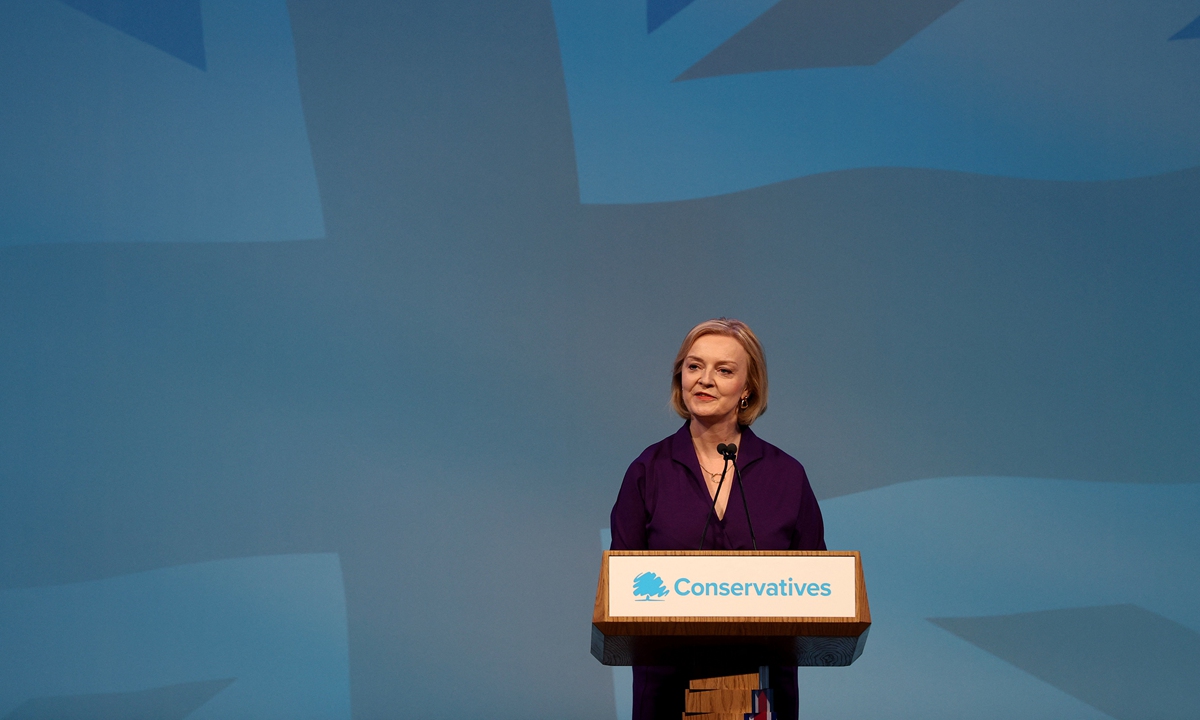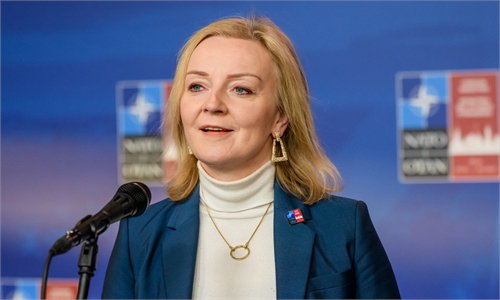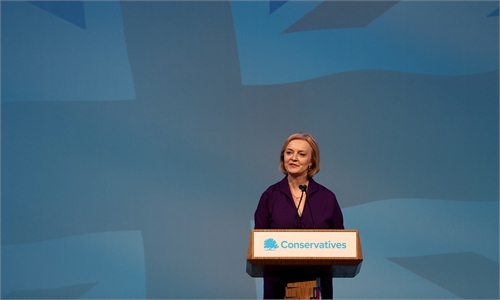Chinese premier congratulates new UK PM, calls on both countries to advance ties on right tack
Closely following US brings no good to new British govt in overcoming domestic mess: analysts

Liz Truss. Photo: AFP
Chinese Premier Li Keqiang has sent a message to Liz Truss to congratulate her on taking office as British prime minister, stressing a stable and healthy development of China-UK relations is in line with both countries' interests and hoping the two countries work together to advance the bilateral ties on the right track.
Chinese observers noted that a pragmatic policy of the new UK administration toward China will be helpful for the Truss government amid severe domestic challenges and warned that stressing perceived overseas threats would not help solve its existing problems, nor will closely following the US help the new British government deal with the raft of current domestic crises.
Chinese Premier Li Keqiang congratulated Truss on becoming the new British Prime Minister and said that the stable and healthy development of China-UK relations is in line with the fundamental interests of the two peoples and China is willing to work with Britain to advance the bilateral relationship along the right track toward long-term stability on the basis of mutual respect, equality and mutual benefit, the Xinhua News Agency reported on Wednesday.
The report followed new British Prime Minister Liz Truss and US President Joe Biden made their first telephone conversation, during which they pledged not only to strengthen the "special" UK-US relationship but also mentioned challenges from Russia and China.
Biden on Tuesday spoke by phone to congratulate Truss on her elevation to prime minister. Both leaders promised to strengthen the "special relationship" between the countries and continue close cooperation on global challenges, including supporting Ukraine as it defends itself against "Russian aggression", addressing the challenges posed by China, preventing Iran from ever acquiring a nuclear weapon, and securing sustainable and affordable energy resources, according to the readout from the White House.
This is the first conversation between Biden and Truss after the former British foreign secretary secured the most votes in the Conservative Party leadership contest among party members on Monday, which made her the new UK prime minister.
Both Downing Street and the White House stressed the "enduring strength of the special relationship" as bilateral relations seemed to have been strained during the reign of former leader Boris Johnson, however, the new British leader and Biden chose to avoid openly talking about the unsolved problems in the bilateral relationship, and instead shifted attention to Russia and China, analysts said.
Truss wanted to show that the UK still attaches importance to its "special relationship" with the US, but in fact the intimacy of the two countries has experienced great changes, Cui Hongjian, director of the Department of European Studies at the China Institute of International Studies, told the Global Times.
The "special relationship" is a concept that has underpinned the US-UK alliance since the phrase was popularized in the 1940s. However, media reported that Truss had showed little reverence for such "special relationship." Last September, when meeting US Secretary of State Antony Blinken for the first time, Truss questioned the special relationship between the two countries. And she said at the Conservative party conference in 2021 that the relationship with the US is "special, but not exclusive" and noted Britain had other important allies like Australia, India and European countries, notably the Baltic States.
Zhao Chen, a research fellow at the Institute of European Studies under the Chinese Academy of Social Sciences pointed out that against the backdrop of the Ukraine crisis, the UK and the US want to show their unity and this is why their Tuesday talk covered bilateral relations and global issues.
Truss and Biden also "discussed their shared commitment to protecting the gains of the Belfast/Good Friday Agreement and the importance of reaching a negotiated agreement with the European Union on the Northern Ireland Protocol," the White House said in the release.
Some Western media noted that the political power transfer in Britain comes at a "tricky juncture" for UK-EU relations as the deadline approaches for Truss' government to respond to reactive legal proceedings launched by Brussels accusing the UK of four infringements to the Northern Ireland treaty.
Zhao told the Global Times that the main problems between the UK and the US concern Brexit and UK-EU relations. Truss has been more radical on Brexit and hopes to alter previous deal on the Northern Ireland protocol. While as a Democrat, Biden supports the EU and does not want to see strained relations between the UK and the EU since it will not be good for the US to rally all allies to counter China and Russia.
For Biden, his main purpose to talk to Truss is to coordinate with the new British leader on key issues to ensure the political transfer of one of his main allies will not affect the US' overall global strategy, especially on countering Russia and China. However, for the Truss government, China will not be a priority given the messy domestic situation, analysts said.
However, Truss may also cooperate with the US in some areas, for example on human rights or Hong Kong affairs to reinforce her own and the UK's images as "human rights fighter," Cui said.
British scholar Martin Jacques wrote in the Global Times that Truss faces a gargantuan problem, including the worst economic crisis of any British prime minister since 1945, with soaring energy prices especially in the upcoming winter.
But there is still no reason for optimism about Britain's relations with China since Truss has strongly hinted that China will be designated a "threat" to national security and treated in the same way as Russia, Jacques wrote.
While expressing concerns about Truss who may bring great uncertainty to China-UK relations due to lack of experience and capability in governance, some Chinese observers called for the new British government to be pragmatic toward China to assist the UK to overcome current challenges. They also warned that unwisely following the US to counter China will not bring any positives in dealing with the current mess.


